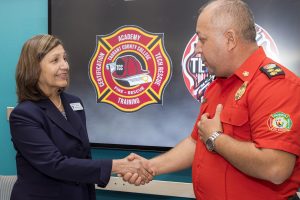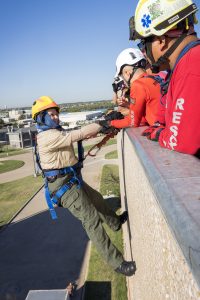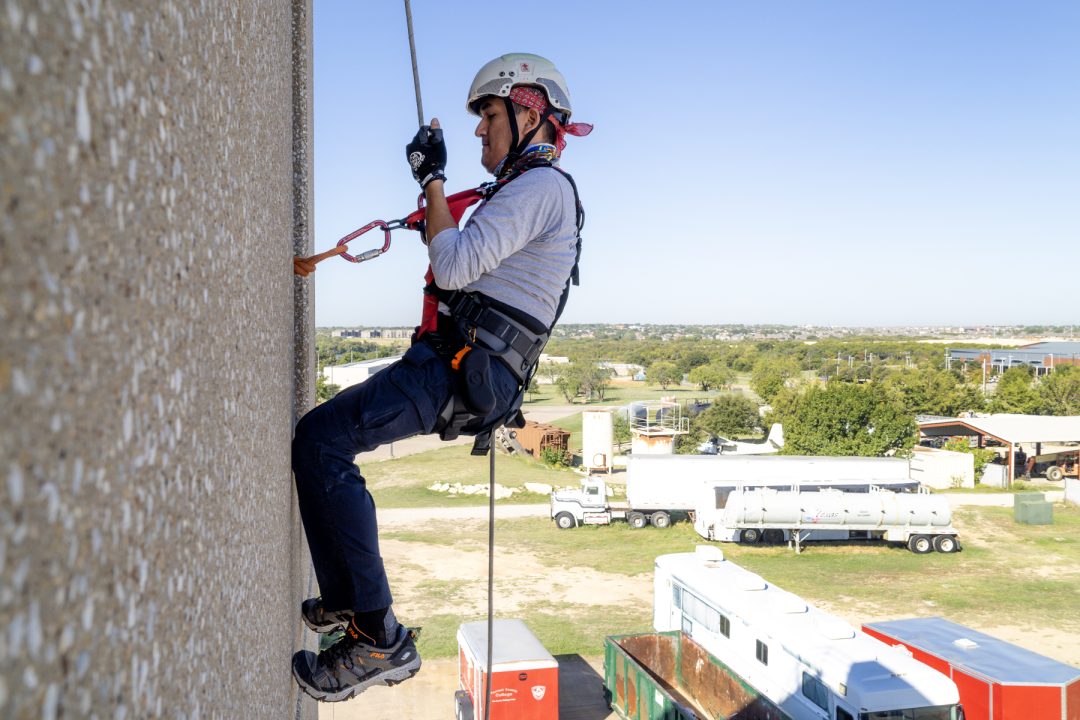FORT WORTH, Texas — Tarrant County College is training an enthusiastic group of firefighters from Colombia, the Dominican Republic, Ecuador and Mexico in a one-of-a-kind multinational collaboration that should resonate throughout Latin America. The only female firefighter in the group, Maria Guadalupe Anaya Esparza, is ready to learn fresh tactics that she can use as a member of the Jalisco State Civil Protection and Firefighters Unit in Mexico.
Esparza said she’s happy to represent female firefighters and looking forward to sharing her new knowledge in her community, which is home to more than 8 million people. “The training will be replicated in the State of Jalisco so that more male and female firefighters in my country can have the knowledge and apply it in emergency services for the benefit of our citizens, who deserve to have qualified and trained professionals.”

Representatives from the four Latin American countries filled a room Sept. 30 to witness TCC Northwest President Zarina Blankenbaker and Santo Domingo, Ecuador, Fire Chief Hugh Parra sign a memorandum of understanding to provide intensive training to international firefighters.
Dr. Blankenbaker said the agreement between Tarrant County College and Cuerpo de Bomberos of Santo Domingo marks the beginning of a strong partnership.
“Together we will enhance firefighting skills, raise safety standards and, most importantly, save lives,” she said. “By sharing expertise, technology and resources, this collaboration will support our mutual missions to protect lives and property.”
Joining Blankenbaker and Parra in the signing were Naftali Guillen, fire chief for the State of Jalisco; Pedro Arevalo, Arlington Fire Department deputy fire chief and president of Lone Star Bomberos; firefighters participating in the training; and several Public Safety Training Center faculty.
Sixteen firefighters are in the first cohort training at the Marine Creek campus. Three Ecuadorian firefighters are in Quito working to contain wildfires near the country’s capital.
TCC’s Public Safety Training Center offers a variety of firefighting, rescue and hazardous materials classes to students and firefighters from partner organizations. During the first week of classes, the Latin America group will focus on rope operations, fire service skills needed in their home countries due to the varied — urban, mountainous, forested — terrain.
The Public Safety Training Center has built a reputation for training some of the finest firefighters in the industry, and the fire chiefs from Ecuador and Mexico wanted their firefighters to learn from the best.
“Firefighters in Ecuador are always looking for new ways to train and learn new information to fight fires, especially those caused by some of the natural disasters,” Parra said. “They come here to learn how North American firefighters deal with fires or natural disasters so they can take that information back and accomplish the mission.”
The person responsible for bringing all sides together, the AFD’s Arevalo, said the partnership between TCC and Ecuador has been years in the making.
“I’ve been an instructor for the Public Safety Training Center Fire Academy since 2007, and I knew the Fire Academy was one of the best,” he explained. “I started thinking, ‘If we can’t go to them, let’s bring the firefighters up here for training.’ I pitched the idea to Steve Keller, and he said, ‘Let’s do it.’ The covid-19 pandemic slowed us down, but we finally got it done.” Keller is director of the Public Safety Training Center.

Arevalo’s nonprofit organization, Lone Star Bomberos, accepts donations of firefighting equipment from across Dallas-Fort Worth and sends the items to fire departments in Central and South America that lack the latest resources. Lone Star Bomberos has helped more than 150 locations in six Latin American countries get equipment and training.
The inaugural class of 16 firefighters will have access to the state-of-the-art Public Safety Training Center. It serves as a hub for three TCC training programs — Fire/Rescue, Law Enforcement and Firing Range.
“I’m grateful for Chief Parra because he works to develop ways to strengthen the Latin America fire departments,” said Camilo Zamudio, a member of the fire department in Yopal, Colombia. “It’s great that the firefighters from Texas, especially Dallas-Fort Worth, help us train.”
While fighting fires and natural disasters is tremendously stressful, Esparza encourages more women to leave their mark on this male-dominated field.
“Fight for your dreams. There are no limits to what you can achieve except those you impose on yourself,” she said. “Nothing can stop us when we do it with our heart. The passion for what you do will make you understand that the limits are mental. We as women dreamers can achieve everything we dream of and make it a reality.”
Learn more about the Public Safety Training Center at TCC.
Tarrant County College is one of the nation’s largest higher education institutions and boasts the second lowest tuition of Texas’ Top 10 community colleges. A comprehensive two-year college with six campuses in Tarrant County and online classes, TCC offers a range of opportunities for learners of all ages and backgrounds, including Associate of Arts and Associate of Applied Science degrees; workforce and economic development programs; technical and skilled trades programs; and customized training for area businesses and corporations.

